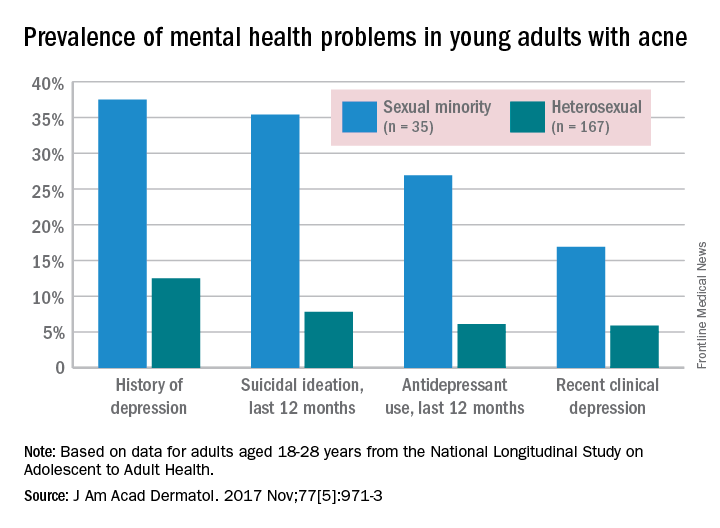Among young adults with acne, nonheterosexuals are much more likely to report mental health problems, according to data from a national cross-sectional study.
Since previous studies have shown that both acne and sexual minority status are associated with increased risk of depression and suicidal ideation, the investigators used data from the National Longitudinal Study on Adolescent to Adult Health, which included 4,094 heterosexual (167 with acne) and 564 sexual minority (35 with acne) adults aged 18-28 years, to examine the relationship between the two.
The prevalence of suicidal ideation in the past 12 months was 35.4% for adults aged 18-28 years who identified as sexual minorities, compared with 7.8% (adjusted odds ratio, 8.05) for heterosexuals. A history of depression was even more prevalent for both groups, although the difference between the two was smaller: 37.5% for sexual minorities and 12.5% for heterosexuals (AOR, 4.25), Yi Gao, a medical student at the Cleveland Clinic Lerner College of Medicine, and his associates reported in a research letter (J Am Acad Dermatol. 2017;77[5]: 971-3).Past-year antidepressant use (AOR, 8.21) and current clinical depression (AOR, 4.1) also were both more common among sexual minorities, who were defined as “those indicating same-sex attraction or sexual orientation other than ‘100% heterosexual,’ ” they said.
“Validated screening tools to assess sexual orientation and depression among patients with acne may identify at-risk individuals and expedite referral for psychological care,” Mr. Gao and his associates wrote.
The investigators did not declare any conflicts of interest. The work of one of Mr. Gao’s associates was supported through a grant from the California Pacific Medical Center Foundation.


